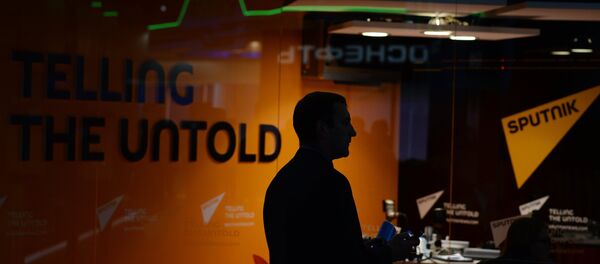The legal basis for such suppression is often thought to be dubious especially when no clear reasons are initially given for what many believe constitutes a violation of the UN Universal Declaration of Human Rights (UDHR).
Censorship on that scale is an obvious demonstration of an information offensive as a means to manipulate public opinion and control the discourse.
Perhaps less visible though are the more frequent assaults on specific pieces of media content that do not make the international headlines.
One organisation engaging in such measures is the East Stratcom Task Force which was set up by the European External Action Service (EEAS) in March 2015 to ‘address Russia's ongoing disinformation campaigns.' Since February of this year the task force has been running a Twitter account called @EUvsDisinfo or 'EU Mythbusters' and has been supporting NATO's information operations in Eastern Europe as part of its wider program of full-spectrum dominance.
This objective is the basis for the two 'products' posted on the Twitter account each week — the Disinformation Digest and the Disinformation Review — in which its team of 'digital Sherlock Holmeses' critique examples of ‘disinformation’ that has been cherry-picked from international media outlets and blogs.
'The Information War Against Russia', a documentary recently aired on Russian television channel Rossiya 1, referred to these reports as 'the EU's instruction manual' to provide the 'correct' line to take. Concerns have been raised on that basis about the political affiliations of the contributors to the project who are said to comprise a network of 'more than 400 experts, journalists, officials, NGOs and Think Tanks in over 30 countries'.
Much of the analysis carried out by EU Mythbusters takes the form of distortion, condescension or outright contradiction of the targeted content. The most recent Disinformation Review contains a two-word evaluation of one particular subject with the phrase 'patently untrue' while other disproofs include 'fabricated evidence' or 'conspiracy theory' and are often attributed to unnamed officials from Scandinavia or the Baltics.
Despite attempts to sidestep the possibility that EU Mythbusters represents the 'official EU position' by stating that its data 'comes from the myth-busting network', all contributions are vetted prior to publication by a secretive central team of 'nine full-time communication experts from the EU institutions or seconded from the EU member states'.
NATO's unstated function as a battering ram for US corporate interests has led some to speculate that EU Mythbusters is yet another example of its thinly-veiled interference in European affairs. One EU official said: 'We’re thinking how best to make use of whatever this team of myth-busters produces.
One idea is a virtual network, anchored in the Council’s communications department, to distribute materials to member states'. This supports the indications that the more long-term intention of the project is to develop and sell 'communication products…in the Russian language which can be used by Russian speaking media.'
On the issue of whether or not the aim is to disseminate propaganda the response was: ‘No — the team's main task is to proactively promote the European Union's policy towards the Eastern Neighbourhood’.






